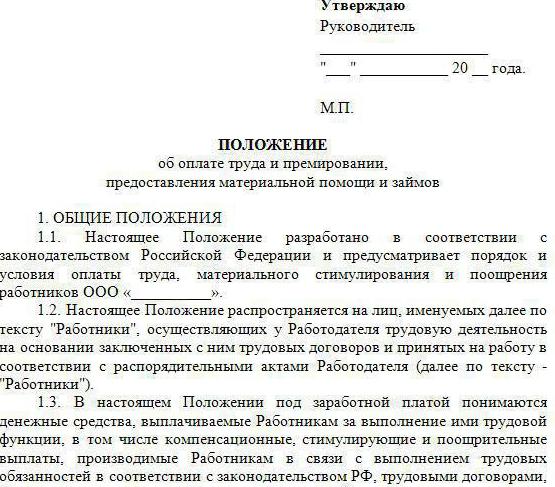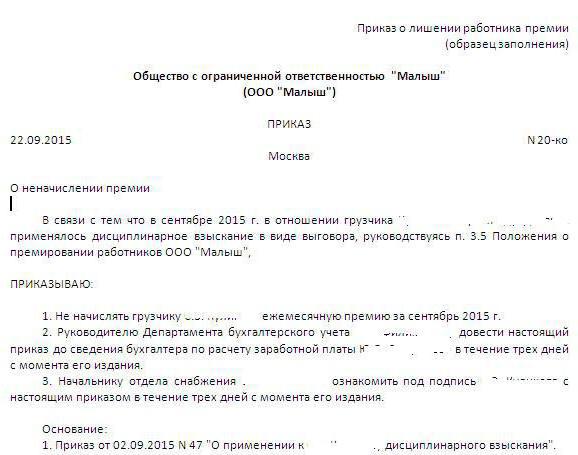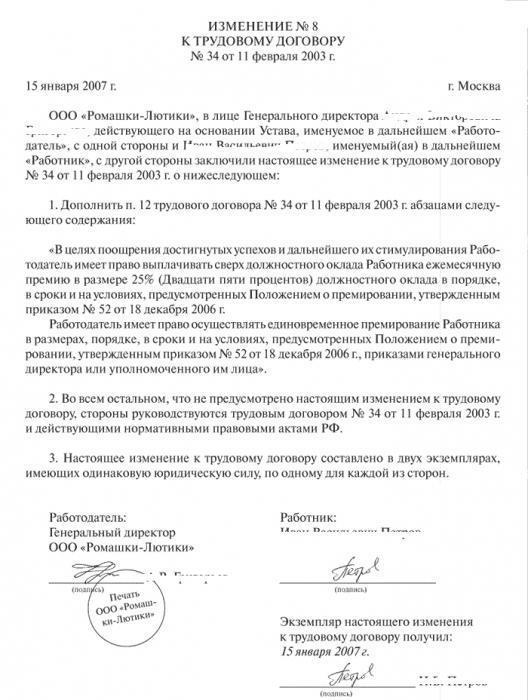An employee may be depressed only if this fact is spelled out in the local acts of the enterprise. To depreciate does not mean that the employee is penalized, but in this case, the employer must follow certain rules so that the deprivation of the bonus is not a violation of the law.
Definition
Depressing an employee means depriving him of bonuses or reducing their size. The premium is considered one of the types of employee income that can be attributed to the salary component.

In each company, as a rule, the size of premiums and the procedure for their calculation are established. If the premium is paid once, then it is not necessary to indicate this fact in regulatory documents.
Is it a punishment
Labor legislation considers all possible types of disciplinary sanctions: dismissal, remark, reprimand. Apparently, there is no depremiation among them. But all the same, the Labor Code of the Russian Federation makes a reference to the possibility of additional types of punishments, if they are provided for by local acts of the enterprise, the charter or federal legislation.

What does it mean to “depremite”? This means depriving an employee of a cash bonus for work. That is, if the employee has not complied with the points specified in the internal rules of the organization or the terms of the job description, then the bonus is simply not assigned to him. The main emphasis here is not assigned, because the employer does not have the right to retain the award already issued. All types of deductions are regulated by Art. 137 of the Labor Code of the Russian Federation, and there is no case of holding premiums there.
Nuances
Before signing an employment contract, a citizen must carefully study it. Particular attention should be paid to salaries, allowances and bonuses. The contract must indicate what parts the salary consists of. And if the bonus is registered as an integral part of the salary, then this is the main income, and not monetary incentive. And if, in the case of any wrongdoing, the manager wants to lower the bonus part of his salary, this will be considered a violation of the law, as it reduces the overall income of the employee.

For the head of the organization, it will be more correct to indicate in the agreement that earnings consist of constant and variable parts. The first will include salary and bonuses for complexity, for example, and the second - bonus. In addition, you can make a reference in the contract to the local act of the organization, which will indicate in which cases the employee can receive a bonus.
Can an employer depress workers in this case? It will be right to say - do not accrue bonuses, because basically bonuses are deprived of those employees who do not fulfill their duties and ignore the instructions of the head. Depremiration cannot be used as punishment.
In order to comply with all legislative formalities, an employee, in addition to an employment contract, must sign a provision on calculating bonuses. In addition, labor law does not allow imposing several penalties on an employee for the same misconduct.
What can an employee be depressed for? For example, he neglects his labor duties and is late for work from time to time. In this case, such an employee can be reprimanded and refuse to award bonuses.
The fact of accrual of bonuses and their size should be established by order of the head. If the premium is reduced or canceled, an order is also signed.
Head Responsibility
And what if the employer decided to illegally deprive? This will be considered a violation, and penalties are provided for this. Basic penalties for the unlawful deprivation of bonuses are regulated by art. 5.27 Administrative Code of the Russian Federation. The penalty is imposed:
- per official and private entrepreneur - in the amount of from 1 thousand to 5 thousand rubles;
- the whole enterprise - in the amount of from 30 thousand to 50 thousand rubles.
If the illegal deprivation of bonuses is repeated, then the fine is as follows:
- per official - in the amount of 10 thousand to 20 thousand rubles. or removal from office up to three years;
- for a private entrepreneur - in the amount of 10 thousand to 20 thousand rubles .;
- to the enterprise - in the amount of from 50 thousand to 70 thousand rubles.
Also, fines for the delay in the payment of not only salaries, but also premiums are set by law. Moreover, such compensation does not depend on the reason for the delay in payments.
Main problems
To depress is to deprive the bonuses. But the main problem for companies where there is a similar system is the inability of an employee to correct their shortcomings before accruing a bonus. In other words, a person will not know that there will be no prize only after receiving a settlement sheet. Consequently, an employee who is deprived of a bonus in this way may lose motivation to work.
The next problem can be called the vagueness of the wording in the regulatory acts of the organization relating to the calculation of bonus payments. The general phrase about achieving high results does not contain any specifics. The employee would be more knowledgeable if the document indicated specific information about what the award could be for.
The provision on bonuses should indicate clear payouts.
For example, you can depreciate in the amount of 50% of the salary. In addition, due to the constant development of the organization, and similar provisions should be reviewed and adjusted with a certain frequency.
Order
If the deprivation of bonuses is inevitable, the manager needs to know how to properly deprive the employee. Any collection, including deprivation of bonuses, must be carried out in accordance with the order.

This document should reflect the decision of the manager on the application of the punishment measure against the employee. There is no definite form of such an order, so each company can use its own approved sample. But, despite this, the order should contain one important point - the basis for depremization. When drafting a document, it is necessary to take into account the grounds of Art. 129 of the Labor Code of the Russian Federation. The wording of the basis should contain information about the refusal to accrue payment, and not about the deprivation of payment as a punishment.
Base
What can be depressed:
- Absenteeism or a long absence from the workplace without good reason.
- Appearance in the workplace in a state of alcohol or toxic intoxication.
- Debauch, theft and other criminal acts.
- Intentional damage to the property of the organization.
- Non-observance of safety measures and labor protection standards.
- Divulging trade secrets.
- Transferring false data to the manager, which leads to material losses.
- Other misconduct contrary to regulatory acts of the organization and legislation in general.
For some of these misconduct, an employee may be fired. The decision on the deprivation is made by the head himself. It is important that he has an act of violation.
Documenting
To depress is to deprive bonus payments, and, as mentioned above, this fact must be documented. The issuance of a bonus and its deprivation should be spelled out in the employment contract, as well as in the regulatory documents of the organization. Applicants must be clearly explained for what misconduct the employee may be deprived of the bonus.

Almost many organizations use in their work special tables developed individually, which take into account the specifics of the enterprise, as well as indicate the causes of depremiation.This table should be familiar to all employees under the signature.
Challenging
In the case when the employee does not agree with the applied deprivation, he has 90 days to refute this. To do this, go to court. There you will need to present an order or indicate the fact of its publication. The employer must prove the fact of the use of deprivation: whether there was a violation of discipline or the tasks were not completed.
How to depreciate if the deadline for depremization is missed? No way, because this fact is not enshrined in the law as a penalty. The prize is the desire of the employer to reward the employee for a good job, therefore, depremiration is the desire to punish for disobedience. The employee does not have the right to deprive the employee of a part of the salary (if in addition to the salary it also includes bonus payments) It's illegal.

It is possible to challenge the issued order of depremization by providing evidence indicating the reasons for non-fulfillment of labor obligations or violation of discipline.
In order for the trial to be objective, you need to submit:
- act of detected violation;
- explanatory note from the employee;
- work sheet;
- a sample of an employment contract, where the fact of deprivation is registered.
The court must determine whether the employee’s actions were intentional, planned, or whether the resulting situation, for which he was deprived of the bonus, was only a consequence of other reasons. For example, an employee who did not come to work due to any type of intoxication or due to a hangover syndrome (which can cause poor health) will not receive an excuse in the court. But if he did not come to work due to poisoning (which can be proved by documents), depreciation will be declared illegal and must be withdrawn by the employer. In the form of evidence, you can use certificates from a medical institution, receipts from purchased medicines, etc.
Justification
If the employee was acquitted by court order, the employer must:
- Restore the employee to the workplace.
- To pay moral and material compensation.
- Accrue money for forced absenteeism.
- Pay all legal fees.
- To be punished according to the law.
Advantages and disadvantages
The depremiation system has both positive and negative sides. The advantages of such a system include:
- Improving discipline in the team because of the opportunity to receive material rewards.
- Increased motivation to achieve indicators in connection with the possibility of receiving a monetary reward.
- The ability to accrue bonuses only to those who deserve them.
- Increased liability of the parties.

But there are some disadvantages:
- A possible manifestation of unhealthy competition and increased tension in the team.
- Negative attitude towards the leader.
- Reduced motivation to work if depremy is illegal.
- Awareness of the absence of a bonus until it is received.
- The desire of employees to achieve results at the expense of quality.
- Deterioration of labor discipline at the enterprise and rejection of the instructions of the head seriously.